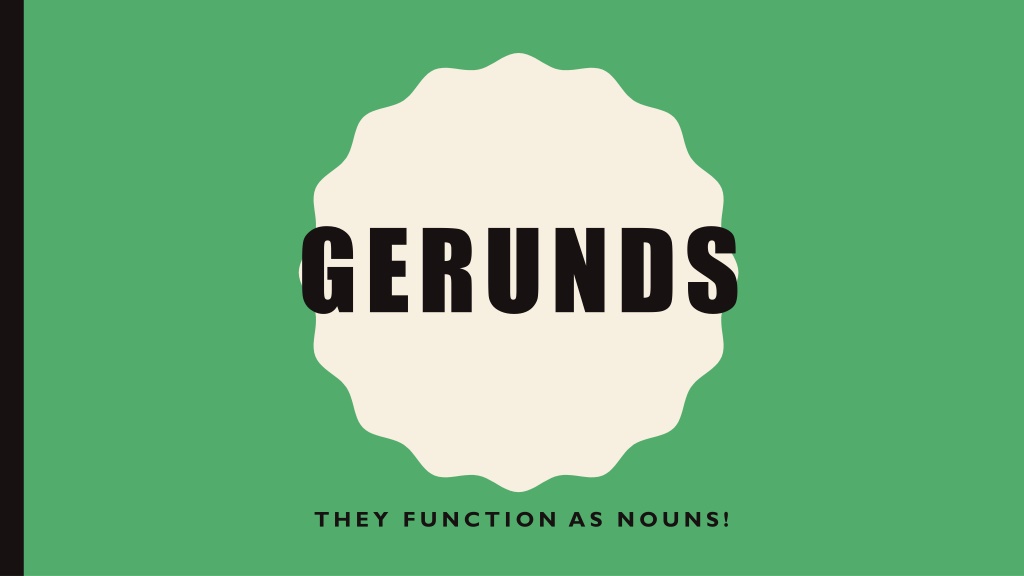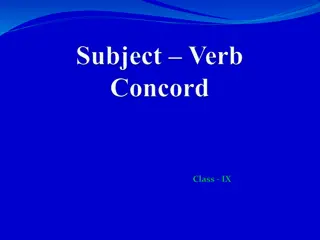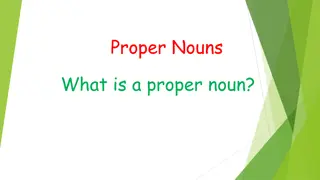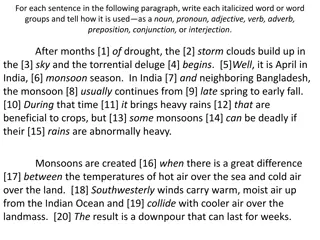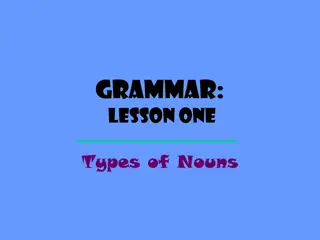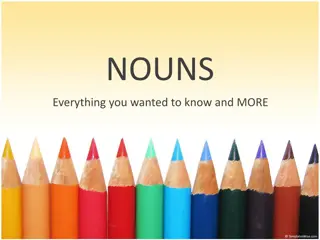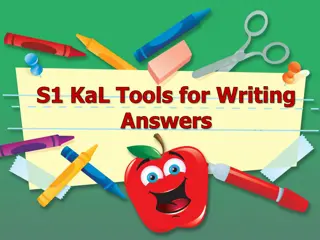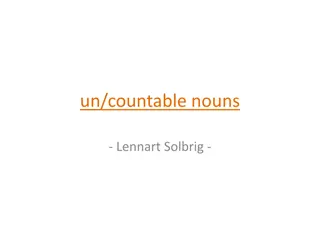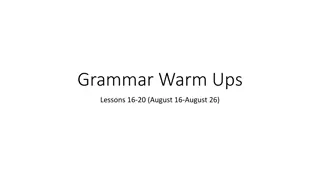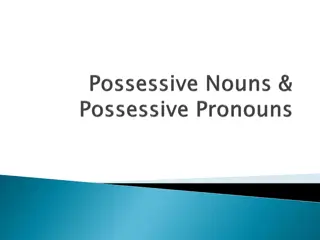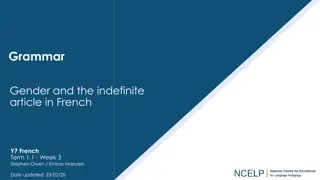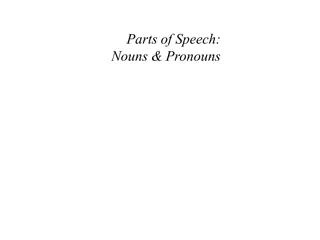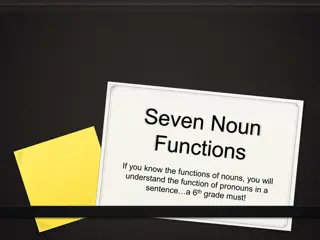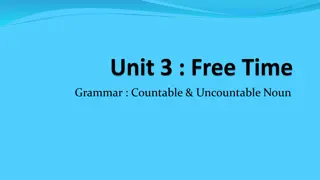Understanding Nouns and Their Functions in Sentences
Gerunds function as nouns in sentences and can serve various roles such as subjects, direct objects, and predicate nouns. Nouns act as the subject of a sentence, telling who or what the sentence is about. By identifying the subject in sentences, you can understand its role and importance in conveying meaning. Nouns also play a crucial role as direct objects, answering the question "What?" after an action verb. Practice identifying subjects and direct objects to enhance your grammatical skills.
Download Presentation

Please find below an Image/Link to download the presentation.
The content on the website is provided AS IS for your information and personal use only. It may not be sold, licensed, or shared on other websites without obtaining consent from the author. Download presentation by click this link. If you encounter any issues during the download, it is possible that the publisher has removed the file from their server.
E N D
Presentation Transcript
GERUNDS THEY FUNCTION AS NOUNS!
HOW A NOUN CAN FUNCTION IN A SENTENCE: Subject Direct object Indirect object Predicate noun /predicate nominative Object of the preposition
NOUN AS THE SUBJECT OF A SENTENCE The subject tells who or what the sentence is about Typically is the thing performing the action (if there is an action verb) To find it, find the verb and ask Who? Example: Pablo enjoys the game of soccer. Who is this about? Who enjoys? Pablo= subject
TRY THESE. IDENTIFY THE SUBJECT OF EACH SENTENCE. 1. AJ can make the pizza on Friday. 2. Buzzing around the room, the bee frightened the children. 3. The waves rose and soared out over shore. 4. Four cups of sugar are needed for this recipe. 5. Justice will be served.
DID YOU SAY? 1. AJ can make the pizza on Friday. 2. Buzzing around the room, the bee frightened the children. 3. The waves rose and soared out over shore. 4. Four cups of sugar are needed for this recipe. 5. Justice will be served.
NOUNS CAN ALSO BE USED AS DIRECT OBJECTS A direct object Is a noun or pronoun it comes AFTER an action verb And answers the question Subject, Action Verb, WHAT? EX: I brought a snack to school. Subject = I Action verb = Brought I brought WHAT? I brought a snack. snack is the direct object.
TRY THESE. FIND THE DIRECT OBJECT IN EACH SENTENCE. 1. This video clip gives many facts about gorillas. 2. A massive fire destroyed the buildings downtown. 3. One must never turn his back on life. ~Eleanor Roosevelt 4. Emon gave a donation to the football team. 5. Hannah knit a sweater for her friend.
DID YOU SAY? 1. This video clip gives many facts about gorillas. 2. A massive fire destroyed the buildings downtown. 3. One must never turn his back on life. ~Eleanor Roosevelt 4. Emon gave a donation to the football team. 5. Hannah knit a sweater for her friend.
NOUNS CAN ALSO BE USED AS INDIRECT OBJECTS An indirect object: -is a noun or pronoun -comes BETWEEN an action verb and a direct object -answers the question: subject, verb, direct object, TO WHAT? FOR WHAT? TO WHOM? FOR WHOM? NOTE: If you do not have a direct object in your sentence, you will not have an indirect object! EX: He gave the teacher a headache. Subject: He Verb: gave He gave what? headache to whom? TEACHER Teacher is the indirect object!
TRY THESE. FIND THE INDIRECT OBJECT IN EACH SENTENCE. 1. She showed me her prom picture. 2. Sheila told Kathryn a story about her vacation. 3. She gave Reggie careful instructions for the assignment. 4. Mom gave Dad a suggestion for dinner. 5. Pete bought Mort a chicken biscuit this morning.
DID YOU SAY? 1. She showed me her prom picture. 2. Sheila told Kathryn a story about her vacation. 3. She gave Reggie careful instructions for the assignment. 4. Mom offered Dad a suggestion for dinner. 5. Pete bought Mort a chicken biscuit this morning.
A NOUN CAN ALSO FUNCTION AS A PREDICATE NOUN (PREDICATE NOMINATIVE) A predicate noun is just that: a noun in the predicate of the sentence. A predicate noun: -is a noun -comes after a LINKING VERB -is found in the predicate of the sentence -renames the subject of the sentence Find it just like you do a direct object: subject, verb, what? EX: Megan is a good leader. Megan is what? Leader. Does leader meet all of the qualifications above? YES! That s your PN!
TRY THESE. FIND THE PREDICATE NOUN IN EACH SENTENCE. 1. Dr. Reuss is a bellhop on weekends. 2. All of the stories are fables. 3. Mark Twain s real name was Samuel Clements. 4. The broiled fish is salmon. 5. A whale is a mammal.
DID YOU SAY? 1. Dr. Reuss is a bellhop on weekends. 2. All of the stories are fables. 3. Mark Twain s real name was Samuel Clements. 4. The broiled fish is salmon. 5. A whale is a mammal.
A NOUN CAN ALSO BE USED AS AN OBJECT OF THE PREPOSITION An object of the preposition is the noun or pronoun that comes at the end of a prepositional phrase. A prepositional phrase starts with a preposition, ends with the OP, and includes any modifiers in between. Some common prepositions: by, to, with, without, up, into, from, in, at, around, during, for, since, toward, over, through, upon, under, underneath, between, along, against, inside EX: I tried making a fruit salad over the weekend. Prep = over Over what? The weekend Which word is at the end? Weekend. Is it a noun? Yes! weekend is your OP.
TRY THESE. FIND THE OBJECT OF THE PREPOSITION IN EACH SENTENCE. 1. The sky looks really dark by my house. 2. She saw two mice climb inside his shoe. 3. I am afraid of the dark, said the little girl I babysat last night. 4. I told him I put his binder near the door. 5. Whenever I m at Jennifer s house, I start sneezing like a madman.
DID YOU SAY? 1. The sky looks really dark (by my house). 2. She saw two mice climb (inside his shoe). 3. I am afraid (of the dark), said the little girl I babysat last night. 4. I told him I put his binder (near the door). 5. Whenever I m (at Jennifer s house), I start sneezing (like a madman).
WHY ALL THIS REVIEW? SO YOU CAN UNDERSTAND GERUNDS A gerund is the ing form of a verb that is used as a noun. Because it is used as a noun, it can take on ANY of the functions of a noun like the ones we just went over! -subject -direct object -indirect object -predicate noun -object of the preposition
CHECK IT OUT! LET S USE RUNNING AS OUR GERUND Subject: Running is my favorite hobby. DO: You should try running on Saturdays. IO: I gave running a shot. PN: She loves running in races. OP: I can t compare anything to running.
BE CAREFUL! Just like infinitives, be careful not to identify the VERB of the sentence as the gerund! I m running a marathon in three weeks. A GERUND WILL ONLY FUNCTION AS A NOUN CAN FUNCTION!
TRY THESE. IDENTIFY THE GERUND IN EACH SENTENCE. 1. Her laughing attracted my attention. 2. By studying, you can improve your grades. 3. Mrs. Cherry was discussing baking. 4. Do you really enjoy painting? 5. After swimming, the children were ready to go home.
DID YOU SAY? 1. Her laughing attracted my attention. (subject) 2. By studying, you can improve your grades. (obj. of prep) 3. Mrs. Cherry was discussing baking. (direct object) 4. Do you really enjoy painting? (direct object) 5. After swimming, the children were ready to go home. (Obj. of Prep)
